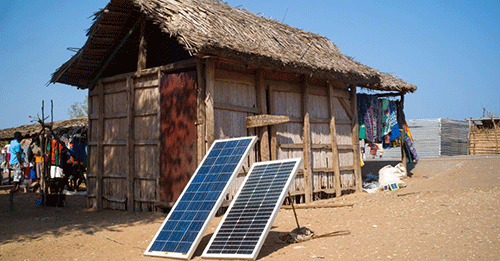In line with government objectives, the mines and energy ministry has set a target to have all Namibian households electrified by 2040. However, this universal electricity access will require great effort and significant investment, considering the country’s overall electrification rate is estimated to be about 50%, meaning that about 300 000 households are still not electrified.
“Achieving universal access is easier said than done. Namibia is a very large country, and has a very small population. As a country, we have a population density of around three persons per square kilometre. Extending the grid to all the corners of our country in this context is very expensive, as electricity infrastructure must be maintained and replaced when it gets old,” executive director in the energy ministry Simeon Negumbo explained.
Speaking at an Electrification Day this week in the capital, held under the theme ‘Accelerating electrification to achieve universal access by 2040’, he admitted that universal access is a daunting task. Negumbo, therefore, called for more coordination and involvement from all stakeholders, including commercial banks, development partners, development financial institutions, as well as local and international financing institutions.
“It’s only through concerted efforts and dedication from all stakeholders that we will reach this target of ours, and maintain our infrastructure for the benefit of all,” he added.
The energy ministry estimates that between 70% to 80% of Namibia’s rural households do not have adequate electricity access. The figures in urban localities are better, as approximately 70% of households in urban areas are connected to the grid.
Said Negumbo: “This is a great number of people who do not have the means to hit a switch and have lights on so that their children can study at night or cook by using modern stoves or preserve their food and drinks in a refrigerator, or run a barber shop or salon that requires electricity to make money and support their familie. It might seem to have been a very long time to reach our desired electrification rate, but taking the limited resources and the competing needs for rural electrification into consideration, every little milestone counts as an achievement”.
As such, Negumbo stated that Electrification Day signifies the beginning of another milestone where the electricity supply industry stakeholders, development partners as well as local and international financing institutions get together to deliberate on the possible solutions to the country’s electrification challenge. Electrification is a national challenge and one which government, through the Ministry of Mines and Energy, is committed to take on. To this end, the ED noted, the Harambee Prosperity Plan has set targets to put the framework in place to speed up the rate of electrification.
“However, I should notably highlight that although it is hard to imagine real development without electricity, the presence of electricity is by no means a pledge for development. It will be up to our own individual choices that high electrification rates will translate into the necessary economic development. On that account, I plead to the business community to see it as their ultimate duty to ensure that they utilise the benefits of electricity, and transform it into substantial economic initiatives,” he continued.
Organisers of the Electrification Day, the Green People’s Energy project, said it is an initiative of the German development agency, GIZ.
The project focusses on establishing conditions to supply rural Africa with decentralised renewable energy by utilising locals and the private sector involved in energy expansion measures.
“With the technologies available locally, energy is mostly generated using fossil fuels, which tends to be expensive, inefficient and hazardous to health. Energy requirements in Africa will continue to climb disproportionately as a result of rapid population growth, increasing economic activity, and a higher standard of living,” the project’s website states.
Recognising that adequate energy supply must be secured to allow for long-term economic development and for countries to achieve the United Nations’ goal to ‘Ensure access to affordable, reliable, sustainable and modern energy for all’, the project implements five components in support of efforts to expand green energy in rural areas. Through this approach, particular emphasis is placed on the involvement of municipalities, cooperatives and local companies.
Through the Green People’s Energy project, a small-scale fund provides financial support for projects by local stakeholders in sub-Saharan Africa.
The project provides more effective and broader training and further education in decentralised renewable energy supply. It also enables access to decentralised renewable energy for productive use and social institutions.
– ebrandt@nepc.com.na



